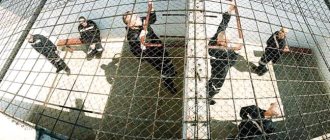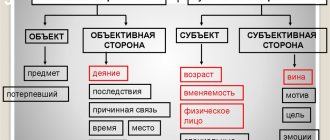The strict hierarchy that reigns in prison and the thieves’ law prohibit a thief from offending “men” or “thieves”. But every rule has its exception. What to do if those who enforce the unwritten code of laws violate it?
First you need to understand the criminal chain of command. At the head of the entire zone are the governor and the overseers. Several thieves in law can be present in one zone at the same time, and so that their interests do not intersect and everything is strictly according to the concepts, one of the thieves is appointed as the main one, that is, the head. If there are no crowned ones in prison, then they can specially “send” their person there from outside. The remaining authorities are relative to the beholders. Each of the latter has a group of so-called thieves who carry out the orders of their thief.
Who are the “roosters” in the zone?
According to one version, the omitted became a separate prison caste after the 1961 reform, during which the camps were divided according to the severity of the detention regime. As a result, the pioneers began to live in the zone separately from seasoned prisoners and repeat offenders .
The pioneers are mostly young people who are unfamiliar with the principles of prison, but strive to win the competition by showing aggression and bullying physically weaker prisoners. And if more experienced prisoners did not explain to them the rules of life in prison in time, then over time their stay there becomes more and more wild.
Any prisoner can fall into the caste of the lowered. But some categories fall here automatically or with a high probability.
These categories include:
- Prisoners who were imprisoned for raping minors.
- People who practiced homosexual relations in the wild.
- Close relatives of law enforcement officers.
Information: in addition to the “roosters”, there is a caste of “devils” in the prisoner community . What these castes have in common is that both are untouchables, but devils are not used for sexual pleasure.
Why are the lowered ones called roosters? Most likely, the name came from the word “cock”, which referred to the process of rape.
Story
There are different points of view about the origin of this phenomenon. According to one of them [1], the reason lies in the reform of the penitentiary system in 1961, when places of deprivation of liberty were divided into several regimes, as a result of which the bulk of the “first-timers” were separated from repeat offenders and from their accumulated experience of life in prison. As a result, the previously uncharacteristic custom of punishing the guilty in the form of forcibly converting him into a passive homosexual began to spread among prisoners. At the same time, there are known cases of former government officials being “incarcerated” in prison as civil executions back in the late 30s.
Who are the divers in the zone?
What does a diver in the zone mean? A "diver" or "gasser" is the name given to a prisoner who clears the air in a cell after releasing gases from authorities or other prisoners. Usually physically weak prisoners who do not know how to stand up for themselves become “divers”.
Another reason for transferring to this caste may be a mistake in front of other prisoners. When someone in the cell wants to pass gas, the command is loudly given: “The guy wants to fart” or “The guy is ready to fart.” At this moment, the “diver” must run up to the speaker and press his face tightly to his buttocks, absorbing all the emitted gases into his mouth. After that, with his mouth closed, he runs to the window and lets them out.
If an unpleasant odor still appears in the chamber, then it is considered that the “diver” did not cope with his job. For this he can be beaten.
Read not only about how detainees live in prison, but also about the tattoos they give to detainees in prison.
How do roosters live in the zone?
Life for those in prison is difficult and sometimes terrible . They live separately in prison, in the so-called cockerel, where the same offended people sit, pinches, pokers). This is the most despised (and by all) category of prisoners. What are they doing in prison?
Those in prison are engaged in the dirtiest work: sweeping the parade ground, local areas; wash baths and toilets; clean the sewerage system, perform work on the lockout; remove and load garbage. Among those who are neglected, there are also those who earn money by selling themselves; they are called “disgruntled workers.”
Ordinary prisoners should not take food that roosters eat . The lowered ones are washed from separate washbasins. They are required to give way to other prisoners.
Representatives of other castes hardly speak to them. Communication with a rooster can result in a loss of authority for a prisoner.
Those omitted must communicate their status to all new recruits. Concealing such information is punishable by severe physical injury. To make roosters easier to identify, special tattoos are applied to their bodies.
They can be placed near the toilet, under the bed (“under the bunk”), and only in large camps are separate barracks allocated for them, which are called cockerels.
The offended use certain household items . Holes are usually made in their dishes so that no one accidentally confuses “grinded” spoons and plates with normal ones. In the smoking room, you can give the rooster a half-smoked cigarette, but under no circumstances should you take the bull from your hands once it’s been put down.
In the camp church they are given separate benches and benches, and in the bathhouse - basins . If an ordinary prisoner accidentally sits at the wrong table or takes the wrong spoon, he automatically falls into the rooster caste. Even if he did not eat or drink from the utensils, he will still be considered omitted.
As soon as an ordinary prisoner finds himself among the caste of roosters, he goes to any lengths to be transferred from the offended to the category of “normal” prisoners.
Note: the number of restrictions and prohibitions for those excluded depends on the type of penitentiary institution. In maximum security colonies, the attitude towards them is more loyal, but in juvenile colonies the wildest rules reign.
What to do if the cops bring a dishonest person into the house?
It is unacceptable for a decent prisoner to sit in the same hut with a dishonest, red or woolly one, or even worse, with an offended one. This article will discuss how decent prisoners should behave if the cops bring wool and other livestock into their hut.
Here we will talk more about the so-called holy places, such as kicha or BUR. In the cells in the central prison, decent people also adhere to similar beliefs, but in view of the fact that in the central prison there is not always room for each category of prisoners, sometimes you have to put up with the fur under the shkonar or the offended near the dalnyak (toilet). The cells of holy places are called that way, because the people kept in them suffer there for their way of life, common deeds and beliefs. Under no circumstances should any fur appear in a decent cell, even on the threshold. If you try to throw a woolly one into the cell, you need to break him (convince him that there is no place for him here and drive him out), if he himself does not catch up and does not break out of the hut. If this does not help, he must be beaten until the cops come running screaming and drag him out of the cell. If the cops ignore the decent one, there is nothing left to do but kill the nit.
If a decent person is thrown into a cell with red goats, and they are not too weak, the decent person will have no choice but to open up, because even death is better than being in holy places with fur or being offended.
How to enter “the hut”
This is perhaps the most difficult moment that brings the first mover to the starting position. Fortunately, now the prison administration is trying to place prisoners in cells in accordance with their “suit.” This makes it possible to avoid conflicts from the first hours of imprisonment, and newcomers can learn prison rules in a relatively calm environment, without the pressure of authorities.
When first entering both the cell and the barracks, the most important things are:
It’s best to stick to a neutral option like “Good evening”, “Good health”, “Peace/evening at home”. It is better to refrain from familiar greetings, especially with a hint of “suit” (such as “Hello, guys” or “Hello, guys”).
You should not immediately occupy a free “shelter” (bed). You should ask if it is free here and if you can settle down. By the way, in the zone they do not “ask” in the usual sense of the word, but “are interested” - this is also better to learn. If they suddenly throw a towel at your feet, you don’t need to pick it up, just step over it. And if they say that this hut is for “roosters”, pretend that you are scared and knock on the door a couple of times demanding to be transferred to another cell.
One experienced convict said that the toughest registration is in the juvenile years, where lawlessness is mixed with outdated thieves' concepts in explosive proportions. For improper behavior at registration, they can even be physically removed, and with a severe beating. In adult prisons and zones (of course, in the “correct” ones), registration now comes down mainly to conversation. The new prisoner is asked who he is “in life”, what he is imprisoned for, and so on. The observer usually acts as the initiator of the survey.
How not to?
If the prisoner is not a homosexual and is not imprisoned under “rooster” charges, then the rooster is released in prison only for malicious offenses. Therefore, in order to avoid the fate of the offended, he must follow the rules of prison life (for those who find themselves in prison for the first time, we provided advice on how to behave correctly in order to survive and avoid unpleasant situations in this material).
Briefly about how to avoid becoming a rooster in prison:
- Watch your words. Do not reveal unnecessary details of your sexual and personal life, do not offend anyone without reason.
- Have pride. Be able to stand up for yourself and demand a response from the offender.
- Minimize contact with roosters. This includes refraining from participating in their beatings and rapes. Even in prison you need to remain human, and humanity is valued there.
- Do not steal from your own people, do not snitch, do not cooperate with the administration.
The following articles will help you learn more about the life of prisoners in Russian prisons:
- Photos of cells in Russian prisons.
- What can be sent to prison by parcel, and what will be returned?
- What do they feed prisoners in prison?
- Is it possible to use a telephone in prison and is there internet?
- How are visits held in prison, how many are there and what can you take with you?
- How to organize a wedding in prison and how will the celebration take place?
- How to divorce a husband serving a sentence in prison?
Decent prisoner
In fact, everything is much simpler than it might seem at first glance. Prisons and camps live by their own unwritten rules and laws - according to the laws of the thieves and criminal world. The rules are very strict, and the punishments match the society in which they are applied - cruel, but fair.
Depending on the actions of life and the path traveled, each prisoner and detainee develops a certain status. Also, depending on the involvement in the life of the general (the social life of the criminal world), each prisoner occupies a certain position in society.
Among free people, this position might be called a position or calling. A decent prisoner is a prisoner who has no nasty offenses behind him, lives a proper prison life, and corresponds to his status and position. In the camps, only decent prisoners may be allowed to participate in general affairs.
Often in camps and central centers I encountered a phenomenon where the only decent people were considered to be those who considered themselves criminals, denied everything that was Mushroom, and were shaking the regime (either they refused or most likely never worked). In our camp, and I think this is fair, even a simple man could be considered decent, behind whom there is nothing vile or unworthy of humanity.
Criminal legal characteristics of insult
Insult is the most intolerable form of humiliation from a moral point of view.
Current legislation defines insult as humiliation of the honor and dignity of another person, expressed in an indecent form. From this definition, the following signs of this act can be identified: - humiliation of honor and dignity; - expressed in an indecent form; — it’s always the other person who is humiliated. The immediate main object of this group of crimes is public relations to protect the honor and dignity of the individual, as well as his reputation. There is no definition of honor and dignity in the law.
Hierarchy of the omitted
Despite the fact that those who are lowered are lower than all other prisoners in the unofficial prison hierarchy, among them there is also a stratification into chief petukhs
(
fathers
,
mothers
) of a higher position, who force their fellow sufferers to do the dirtiest work, mock them, etc. and simple “low-down” ones.
The “chief roosters” are often former “authorities” who have been taken to the roosters for some kind of misconduct or “jamb.” This is especially often observed where the administration of a zone or prison collects them in separate detachments or cells ( offenders
,
cockerels
). According to some reports, the Ministry of Internal Affairs of the USSR conducted an experiment, collecting those “deported” from all over the country into one special colony. The experiment failed: gathered together, the “roosters” built their own, much more cruel, hierarchy, subjecting each other to sophisticated torture and bullying, not typical for ordinary zones.
Offended
Omitted
(
fag
,
rooster
,
offended
,
balabol
,
waffler
,
daisy
,
Mashka
,
Dunka
,
Vasilisa
- the concepts are not completely synonymous, see below) - a representative of the lower caste of prisoners in Russian penitentiary institutions. It is usually believed that “omitted” are prisoners who enter into homosexual contacts in a passive role (voluntary or forced), although in practice this is not entirely true - a prisoner who has not entered into such contacts can also become “omitted” (in this case a prisoner can often “prove” that he does not belong to a given caste). The opposite statement is always true - every prisoner who has entered into homosexual contact at least once as a passive partner automatically becomes omitted.
Why do they get disqualified?
According to thieves' concepts, a person can be lowered
(make omitted) only for very serious offenses, for example:
- Snitching
- Ratting (theft from other prisoners; theft of property belonging to a correctional institution or its employees, on the contrary, is considered valor)
- Debt not returned on time (especially card debt); sometimes the conditions of the game may directly stipulate that the loser becomes a rooster, which can be used for provocation when a prisoner, still unfamiliar with prison customs, is offered to play something “for nothing”, “for bullshit” (both expressions imply that the loser pays with itself, and ignorance of this is not an excuse). Another way of provocation is to treat the newcomer to food and then demand payment. But at the same time, the deceiver himself risks falling into the omitted
- Lawlessness - gross violations of thieves' "laws" (for example, beating and lowering other prisoners in the "press hut" on the instructions of the prison administration).
Descending without sufficient reasons is considered “lawlessness,” and those who commit it are sometimes themselves subject to descent. However, the status of those released “due to lawlessness” does not change because of this, although they are usually treated better than other roosters - they are not beaten, not forced to do dirty work, or provide sexual services (especially if the prisoner was released on the instructions of the prison authorities, for example, for refusal to cooperate with the investigation).
pigs fall into the lowered ones
— prisoners who don’t take care of themselves, don’t wash, and dress sloppily.
Those convicted of rape and other sexual crimes (especially those committed against minors), and former law enforcement officers (who for some reason did not end up in special zones) are also omitted.
There are also frequent cases of prisoners being released on the orders of the zone authorities, especially in the so-called “red zones” (where informal power belongs to the administration, not the prisoners).
Touching the gritty
things may also entail being relegated to
omission
; in some areas, someone who touches
a greasy
object must eat a bar of soap to avoid becoming
omitted
. In addition, a prisoner who spent the night in a “rooster” cell automatically becomes “dead”, even if he did not eat anything there or touch the detainee’s things.
Sometimes a prisoner who has done some work related to plumbing can become a “rooster.”
Persons of homosexual orientation in the zone automatically become omitted if their cellmates become aware of this; but a heterosexual who has committed any sexual acts unworthy of men (from the point of view of thieves’ “concepts”) (for example, cunnilingus) can also be transferred to roosters. As a rule, the vast majority of omitted
- These are men of heterosexual orientation. It should be noted that no prisoner is required to tell others about his sex life while out.
There are also cases of voluntary transition to “lowered” prisoners with homosexual inclinations or those seeking to gain material benefit by engaging in homosexual prostitution.
Attitude towards the omitted
The omitted are the lowest caste in the prison hierarchy, which predetermines their position in places of detention: in relation to other prisoners, the omitted have no rights, there are only responsibilities and prohibitions.
There are many taboos regarding prisoners, with new ones constantly appearing, and the prohibitions themselves vary in different types of prisons. For example, in the so-called In “young children” the taboos are especially cruel and numerous (it is believed that most of those who are rejected become such in “young children”), in adult prisons (especially high security) there are not so many prohibitions, and the situation of those who are rejected is better (for example, in high security prisons it is not customary to beat omitted for no reason, for entertainment).
Responsibilities and prohibitions of the offended
The responsibilities of those omitted include performing the dirtiest work, such as washing toilets, emptying buckets, cleaning sewers, and cleaning workshops. Other prisoners cannot take the food that the roosters eat. Those who are lowered are washed from separate washbasins. They must give way to other prisoners.
Conversations with members of other castes should be limited.
They are not completely prohibited, but talking to a rooster for a “man” can be fraught with loss of authority.
Those who have been omitted are required to immediately inform all new acquaintances of their status. Concealing information is punishable by severe physical injury. To make roosters easier to identify, special tattoos are applied to their bodies.
In some cases, it is possible to deviate from the established rules if this promises greater benefits. For example, if only roosters can carry packages, then you have to allow them to touch the products; this is not considered “stuff.”
What do they do with roosters in prison?
Once the main duty of the roosters was the sexual satisfaction of prisoners, but now it is practiced only on a voluntary basis.
Since, according to prison rules, it is forbidden to have sex with a prostitute without giving him a gift, many representatives of this caste engage in voluntary prostitution for reasons of material gain.
Help: the number of restrictions and prohibitions for roosters depends on the type of correctional institution.
In strict regimes, the attitude towards them is the most loyal, and the wildest orders reign in colonies for minors.
Beating of roosters is practiced only when they violate their duties and prohibitions. You cannot hit them with your hands, only with your feet, which makes the process especially humiliating for the offended person.
Terminology
All concepts: “offended”, “rooster”, “fag”, “lowered”, etc. mean a representative of the lower caste of prisoners, but their meaning may vary slightly. There are no established rules for the use of this or that word; in some sources these concepts are used as complete synonyms, in others the difference between them is indicated. For example, in the book “Everything about Life in Prison” [1] it is indicated that “omitted” is a prisoner who forcibly or voluntarily became a passive homosexual, and “offended” is a representative of this caste who has not entered into homosexual contacts. In other sources, these groups are called, respectively, “pierced” and “unpierced fagots,” “working cocks” and “forshmaki,” etc.
What are they doing?
Contrary to the stereotype, the proportion of voluntary homosexuals among those offended is low.
Most prisoners become cocks for offenses unrelated to the sexual sphere.
Below is what people are put in prison for. Usually these are various serious violations of the rules of prison life:
- Failure to pay card debt. Unrepaid debts in prison have to be paid in blood, and the only alternative to save life is the provision of sex services.
- Body contact with another rooster outside of sexual intercourse. This rooster is punished very cruelly after such incidents (even to the point of being killed), but the person with whom he came into contact never ceases to be degraded. The offended, driven to despair, often take advantage of this for the purpose of revenge. Sometimes physical contact is not necessary - just spending the night in the cockpit is enough.
- Weakness of character, inability to stand up for oneself. For some things (for example, for sending to ...) you must definitely ask for an answer. If the offended party does not do this, then it may lose all its authority and move into the category of the offended.
- Snitching.
- Stealing property from other prisoners.
- Putting another person down without a good reason.
- Cute appearance, high-pitched voice, affectation - these factors increase the likelihood of getting a residence permit in the rooster's corner.
Release can also be carried out by order of the prison administration to remove unwanted prisoners from prison life.
The most popular method is to lock the prisoner in a cockerel at night.
But the attitude towards such neglected people in the prison community is more loyal.
The 2000s and beyond have seen a shift away from descent by rape. This is due to increased control over the internal regulations of correctional institutions, and greater attention has been paid to protecting the rights of prisoners.
According to Article 132 of the Criminal Code, the term for gang rape ranges from 4 to 10 years. For this reason, other rituals, such as rubbing the lips with the penis, began to be used instead of sexual violence.
Lowering
Lowering decision
(translated into
omitted
) is accepted by the viewer of this camera.
The cockerel
being lowered is raped, often with the entire cell.
Before rape, the person being lowered to suppress resistance is often beaten or strangled with a towel until he is semi-conscious, and sometimes his front teeth are knocked out (to avoid being bitten during oral sex). However, in order to be transferred to the lower class, rape is not necessary; in many cases, a prisoner is simply given a “rough” sweep across the lips, paraffinized
(urinated or masturbated on the face), doused with water from a bucket, etc. Sometimes a decree from the “authorities” is enough to consider such -someone imprisoned by the “rooster”.
After this, the prisoner is considered released. A dejected person is sometimes forcibly given a tattoo - a sign of belonging to the roosters (an image of a rooster or the devil, bees on the buttocks, a dot above the upper lip, the word fag
, a patterned ring around the finger, etc.; sometimes a “free man” can get a “rooster” tattoo out of ignorance. ", which can lead to serious consequences for him if he ends up in prison or meets with thieves"). Sometimes a prisoner who has committed a serious offense can move to the lower prison himself, without waiting for the inevitable punishment (for example, by moving things to the rooster corner of the cell). In this case, no additional procedures are performed. In the last 2 decades, “lowering” has practically not been used in prisons and colonies. Because it is from those forcibly “removed” that the administration in the “red” institutions forms the so-called. active collaborators of the administration who are sent to solve operational problems. Often these “accomplices” carry out reprisals against authorities. According to current concepts, forced “lowering” is “whoredom,” that is, an act that is punishable up to death.
Other types
- “Chushki” are prisoners who do not take care of their personal hygiene. They don't shower or wash themselves, so they always look unkempt. Most often, people with severe somatic or mental illnesses become “pigs”. The attitude towards pigs is disdainful, they are mocked or used for their own purposes. “Chushki” become an object of ridicule; many prisoners do not like to touch them with their hands. If the cellmates demanded that the “chushka” take a bath, and he refused, then he is beaten. On the back or upper third of the shoulder, those who have distinguished themselves are given a tattoo in the form of a pig’s muzzle, often with pretty or even feminine features.
- In prisons, excessive helpfulness is not held in high esteem, so prisoners who try to please everyone end up in the “sixes.” The attitude towards them is better than towards the “dismissed” or “offended”, however, they must carry out all assigned orders unquestioningly. For refusal, the “six” can be beaten, and in case of serious violation of the rules of prison ethics and non-compliance with order, he can be transferred to the rank of “deleted”.
- “Fuflyzhniki” are another group of prisoners who have no authority in the zone. These are prisoners who have a gambling debt and are unable to pay off. If the debt is not returned within the agreed period or an alternative solution is not found, the prisoner is assigned an appropriate name. At any opportunity, the “fuflyzhniki” are raped and lowered.
- “Wool” or “woolen” are called prisoners who grossly violate the rules of prison ethics and subordination. This could be the rape of a normal prisoner, torture or beating of other prisoners for the purpose of giving false testimony and falsifying facts. As a rule, former authorities who have grossly violated the law of thieves become “wool”. Other prisoners do not like such prisoners and either transfer them to the rank of “lowered” or beat them to death.
- According to prisoners, prison is not a place for the faint of heart. All physically weak or mentally labile prisoners (prone to depression, tearfulness) are transferred to the rank of “shelupen”. They become the object of mockery and persecution, they are humiliated and severely beaten for the slightest mistake. “Shelupen” often becomes depressed due to the inability to stand up for oneself.
The prison hierarchy is a strict system that does not tolerate violations of prison ethics. If the unspoken rules are not followed, the prisoner falls into the rank of “lowered” or other low-status castes. It is impossible to get out of this caste; the resulting status will haunt the prisoner until the end of his prison term.
Hygiene rules in places of detention
The rules of personal hygiene in places of deprivation of liberty have been elevated to almost the rank of religion. The first mover is judged not only on merit and conversation, but also on cleanliness. This is natural: in a confined space, any violations of hygiene are felt and smelled especially clearly.
After each visit to the toilet, you should wash your hands thoroughly. If they notice that you shook hands with someone without completing this basic procedure, they may call you to account. If you drop something on the floor, you need to wash it, but you absolutely cannot pick up food from the floor.
You cannot eat, prepare food or tea while someone is in the toilet. On the contrary, if cellmates are sitting at a table, you should refrain from going to the toilet. Every day you need to wash your feet, keep things clean, and check yourself for parasites.
Source
Offended: what does this mean?
Those offended in the zone - who are they? The “offended” caste is a group of prisoners who are not homosexuals or forcibly deprived , but are still ignored in the zone. This group includes:
- “finished” with “ridges”, i.e. those who touched him and his things or communicated with the “rooster” of their own free will;
- those who lost at cards and did not repay the debt;
- child killers;
- prisoners subjected to constant beatings and unable to stand up for themselves.
Even the most authoritative prisoner can “finish up” and become “offended”: the rules of communication with “crests” are the same for everyone. And in some cases, authorities are subjected to “finishing” on purpose - on the orders of another prisoner, the “lowered” person can himself approach the authority and touch him. As a rule, “combs” commit such actions out of despair, in cases where they are threatened with reprisals for failure to comply with an order.
However, after “finishing” another prisoner, the “comb” exposes himself to no less danger: he can be killed for his offense.
The rights and responsibilities of the “offended” are the same as those of the “omitted”. Basically, the division between these two castes is very arbitrary and is based only on the presence or absence of sexual contact with the male sex.
At any moment, the “offended” person can be sexually assaulted and relegated to the rank of “dismissed.”
We invite you to watch a video about those offended in the zone:
Why do you need to sit in a basin?
In prison there is a special form of testing a prisoner for “leakyness” - i.e. for sexual contact with a man. To do this, they bring him a basin filled with cold water, into which the prisoner must sit down, having first lowered his pants.
If bubbles appear in the water, the prisoner is considered “punched.” But this is more of a myth. It’s unlikely that anyone is doing this now.
Insult by concept
It is better not to use the words “goat”, “horned” and the like; you don’t even need to say this about a sweater made of goat hair.
Fuck the goat, by the way.
You can’t send him either - he’s a goat, not a rooster. You can’t say to a heated person: “Why are you freaking out?” The ramshackle barracks in which the men live cannot be called a chicken coop.
In general, it is better to exclude all “bird” names from your speech. In the zone, in general, the responsibility for speech is much higher than in the wild.
We recommend reading: Paying debts for individual entrepreneurs
Who is the crest called?
Openly passive homosexuals are called "combs" ("cocks", "lowered").
Any prisoner who has been sexually assaulted in the zone can also become a “crest.” This can happen in several cases:
- insult to authority;
- failure to comply with orders;
- losing at cards;
- inability to stand up for oneself and defend one’s own opinion.
People become “combed” in prison not only after sexual intercourse. The lowering process includes 3 different methods:
- standard – sexual violence and forced anal sex;
- rubbing the lips, face or bare buttocks with the erect penis of another prisoner;
- ejaculation on the prisoner's face.
The last two methods can occur without the knowledge of the person being omitted. At this moment he may be asleep or unconscious after being severely beaten by his fellow inmates.
It is impossible to hide the fact that a prisoner is homosexual or was released for a mistake. If other prisoners who came into contact with him found out about this, they could beat the “comb” to death. The reason for this is the “stuffing up” of the entire “people’s hut”, i.e. normal prisoners, living “according to concepts”, soiled themselves due to contact with him.
The “combs” are the lowest and powerless caste in the prison hierarchy . They have only duties and taboos. "Crest" does not have the right:
- talk with other prisoners;
- approach authorities closer than three steps;
- touch other prisoners;
- sleep on bunks;
- eat with other prisoners and use common utensils;
- go to a common toilet or use washbasins and showers;
- touch your own transmission and take something from there.
Holes are drilled in the crockery and cutlery of the “combs” so that other prisoners can recognize the “grinded” utensils and not touch them and avoid being “finished.” After eating, their dishes are placed separately from the common ones and washed in the designated sink, marked with paint.
Washbasins and showers that are “lowered” are also marked with paint. In some prisons (for example, in Siberia) there are special stripes in the form of blue stripes on the outer clothing of the “crests”. All these measures are designed to ensure that other prisoners can protect themselves from contact with them as much as possible.
Many "combs" are forcibly branded . They have a tattoo on their back in the form of a crown with all the card suits - this means that the prisoner is ready for all types of sexual contact. Instead of a crown, there may be a tattoo in the form of a ring with two red suits on the sides, a rooster, a rose blooming in the hands, or a black dot near the eye or lips.
The “comb” must move around the prison at the end of the column, retreating several steps from the last prisoner. If an authoritative prisoner is walking along the corridor where the “comb” is located, then the “comb” should press tightly against the wall and let the passerby pass.
He sleeps “lowered” in a cell near a bucket or under a bunk . You can’t come close to the “cock’s nest” - it is believed that you can “finish yourself”. In some camp barracks there is a special “rooster corner” where all the “lowered” gather and live separately.
In large colonies, the “roosters” have their own overseer - the “rooster godfather”. He monitors order and compliance with the rules among his charges, and also organizes work and distributes responsibilities among the rest of the “roosters”.
In prison, “combers” usually do the dirtiest work: cleaning toilets and showers, taking out buckets, raking out garbage pits. If an authority figure or an ordinary prisoner approaches a “lowered” person with the intention of committing a sexual act, then he does not have the right to refuse. Moreover, after sexual intercourse, he must wipe the partner’s genitals with a prison towel.
All prison towels are considered “scummy”, so ordinary prisoners never use them for personal hygiene, even after washing. If you refuse sexual intercourse or if one of the taboos is violated, the “comb” is severely beaten.
You can’t touch it with your hands, so they only hit it with their feet or improvised objects. Touching the “omitted” or objects that he touched earlier is unacceptable , otherwise the prisoner goes to the rank of “finished” or “offended”.
Many "combs", trying to adapt to the harsh realities of imprisonment, begin to engage in sexual prostitution. For their work they take payment: a piece of sausage, a cigarette, sweets. At the same time, not paying the “comb” is considered humiliating, and a prisoner who has not paid his payment is transferred to the rank of “offended”, and soon he himself may become “omitted”. Homosexual prisoners involved in sexual prostitution are often given female names but retained male surnames.
We invite you to watch a video about roosters or combs in the zone:
Read more about who the omitted ones are and how not to become a “rooster” in the zone, and in this material you can find out how the omitted ones live in the zones.
Why do they put you in prison?
People become roosters for completely different reasons . Most often, those convicted under Art. 131 of the Criminal Code (rape). This also includes libertines, molesters and homosexuals, regardless of what crime they committed.
But according to statistics for 2022, prisoners increasingly began to fall into the excluded category because of “shoals” they committed that were unworthy of the title of prisoner . So, for example, a “decent” prisoner is not supposed to do work related to plumbing; This type of activity is exclusively for roosters.
By the way, contrary to the stereotypical opinion, the proportion of homosexuals among those who are rejected is low. Most convicts become criminals for actions unrelated to the sexual sphere.
Usually expelled for various violations of the rules of prison life, such as:
- Failure to pay card debt. Unrepaid debts have to be paid for in prison with blood, and the only way to save life is to provide sex services.
- Skin contact (but not sexual intercourse) with another rooster. The initiator of such contact is then severely punished (even to the point of murder), and the prisoner with whom he had contact goes into the category of the excluded, forever. Desperate roosters often take advantage of this to take revenge. To get down, you just need to spend the night in a cockerel.
- Snitching.
- Cute appearance; properties inherent to the female sex, for example, affectation, high voice.
- Manifestation of weakness of character, inability to stand up for oneself.
- Stealing property from other prisoners.
- Putting a person down without a serious reason.
They can also be released by order of the prison administration in order to eliminate undesirable convicts from prison life. To do this, most often the victim is locked in a cockerel all night. After this, the prisoner automatically becomes a rooster.
True, the attitude of the prison community towards such offended people is more or less loyal.
After the 2000s, there has been a move away from going down through rape. This is due to the fact that more attention has been paid to protecting the rights of prisoners, as a result of which control over the internal regulations and way of life in correctional institutions has increased.
Roosters in prison - who are they?
Those excluded from prison life are a caste of untouchables. How do people living in prison live?
They live separately from full members of the prison community: under the bed (“under the bunk”), near the toilet.
In large camps, separate barracks are allocated for them, which are called cockerels.
Those who are omitted use individual household items.
Holes are made in their dishes so that no one accidentally confuses “grinded” plates and spoons with normal ones.
Life for those in prison is very difficult. Roosters do the dirtiest types of work.
There are several theories about the origin of this caste.
According to the most common version, those released were separated into a separate prison stratum after the 1961 reform.
She divided the camps according to the severity of the detention regime: seasoned prisoners, repeat offenders began to live separately from the original prisoners (you can find out what types of prisons exist in Russia today and what regimes there are there).
The pioneers are, as a rule, young people striving for competition in all spheres of life; they did not know the principles of prison and, in the absence of supervision by more experienced prisoners, their life became more and more wild over time.
This has led to the fact that punishment by rape, which before the reform was an extreme measure used in isolated cases, has become widespread (read about types of violence in prisons here).
Any prisoner can become omitted.
But some categories of people are assigned to this caste automatically or with a high probability.
These include:
- People who practiced homosexual relations in the wild.
- Prisoners who were sent to prison for raping minors.
- People whose relatives work in law enforcement agencies.
Information: in addition to roosters, there is a caste of devils in the prison community.
The lowered devils share the status of untouchables, but they are not used for sexual pleasures. Automatic lowering is becoming less and less common in prisons. The attitude towards people imprisoned under “rooster” charges will not be good, but sexual violence will not be shown towards them.
Why is it called a rooster in prisons? There is no exact answer to this question. Probably, this name comes from the verb “cock”, which denoted the process of rape.
About the prison hierarchy
Prison society is deeply hierarchical. This imposes strict limits on the system of relationships between convicts. First of all, the “suit” of the prisoner matters:
The backbone of the prison community, a sort of local elite. The thieves enjoy the maximum number of privileges, but many restrictions are also imposed on them. “According to the rules,” they are prohibited from working, obeying the administration, or cleaning, and previously thieves in law were not even allowed to have a family. The thieves adhere to strict rules, and if you learn them, there should be no problems. These people are interested in maintaining order in the cell, and from among them are appointed guards and overseers, designed to prevent lawlessness. It is better to treat them with respect, but without servility.
The most numerous class, so to speak, is the people. The men work quietly, live according to general rules and expect to quickly return to freedom, to ordinary society. If a first mover manages to avoid mistakes at the start, as a rule, he becomes a man. This is the ideal position.
- Offended (omitted)
But these are precisely the people who made these same mistakes (with the exception of voluntary homosexuals or those imprisoned for rape). Usually these are incorrectly spoken words and certain actions (theft from one’s own, denunciation to the administration, communication with other people from this caste). Previously, the ritual of “lowering” involved committing a homosexual act with a potential victim; now this is rare and mainly occurs among minors. In women's prisons and colonies, homosexual relations are not taboo at all.
The administration's collaborators, doing its dirty work in the hope of leniency. Being part of this group is low, so rarely does anyone cooperate with the administration voluntarily.
The bottom line is to keep your eyes and ears open at all times.










